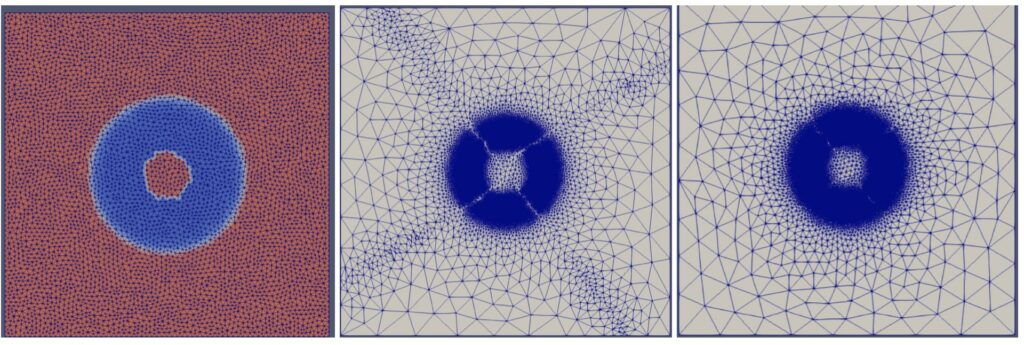1. Welcome
|
|
|
Autumn has arrived, and so has the feedback from the EC’s review of the EXCELLERAT project, which took place in July 2020. We are currently implementing these valuable recommendations and are thus further improving our project work.
|
EXCELLERAT’s second year will finish at the end of November, leaving just one year to go. For this final third of the project, we will focus on achieving further research results and developing our sustainability model. We will also produce more success stories and increase the promotion of our services, as well as building deeper collaborations with our interest groups.
The EXCELLERAT project’s progress is reflected in this issue, which includes a success story with AVBP, one of our core codes. You can also read about how engineers can effectively leverage HPC technology in an article by our partner Arctur, and check out our presence at events, as well as further news about the Centre of Excellence.
|
I hope you enjoy reading our newsletter and stay tuned for more information to come within the next months!
|
|
EXCELLERAT Project Coordinator
|
|
|
|
2. Success story: Enabling parallel mesh adaptation with Treeadapt
|

|
|
CFD remains highly dependent on mesh quality. Advanced meshing software is generally limited to sequential or shared memory architectures. Therefore, meshing requires tens of hours to generate highly complex grids and it is highly dependent on user experience. Refinement zones are also bounded by standard geometrical shapes. To bypass these bottlenecks, codes have turned to mesh adaptation as a solution but massively parallel mesh adaptation workflows remain scarce and require efficient load balancing, interpolation and remeshing techniques.
|
|
|
|
3. Blog article: How can engineers effectively leverage HPC technology?
|
|
|
When developing or improving products, engineers face the challenge of analysing complex simulations to test their designs. High-performance computing (HPC) is used to solve major problems in engineering by performing demanding operations such as simulations relatively quickly. Also, by processing more precise operations, HPC can avoid the errors that might be introduced by humans.
|
Engineers use HPC mainly for performing simulations: these digital models, comprising huge amounts of numbers and algorithms, can determine a product’s viability. When performing simulations, the experts can track the behaviour of the product by including several components. When the simulations are complete and the results have been analysed, engineers can successfully improve or develop new products.
|
|
A recent blog article deals with use-cases that demonstrate how HPC can be used effectively within the engineering sphere.
|
|
|
|
4. Events
|
|
|
|
NAFEMS DACH 2020 conference (13-14 October 2020)
|
Ralf Schneider from HLRS will give a presentation in German about EXCELLERAT, titled "EXCELLERAT: Wegbereiter für die Entwicklung zu Exascale". The presentation will take place virtually on 14th October at 14.30 CEST. Register now to watch it.
|
|
Supercomputing 20 (9-19 November 2020)
|
At a virtual booth of our partner HLRS at Supercomputing 20, we will give a presentation about EXCELLERAT.
|
|
International CAE Conference and Exhibition (30 November - 4 December 2020)
|
We will also give a presentation during a special HPC session and we will be represented with a booth together with MaX CoE at the virtual International CAE Conference and Exhibition from 30th November until 4th December 2020. You can register now and visit our booth there!
|
|
Are you looking for further opportunities to see EXCELLERAT in action or to meet our colleagues? Explore our event calendar to see which trade fairs, (research) conferences, and other events we will attend.
|
|
|
|
5. News
|
|
|
|
EXCELLERAT collaborates with the HiDALGO CoE
|
The two Centres of Excellence (CoEs) HiDALGO – HPC and Big Data Technologies for Global Systems – and EXCELLERAT are successfully collaborating, for instance in the improvement of HiDALGO’s Urban Air Pollution Pilot. Together they pushed forward the pilot case, as they improved mesh quality, speed-up, and parallel efficiency of the Urban Air Pollution Pilot. This success was efficiently achieved within a few months thanks to the excellent exchange of knowledge and cooperation. For further information, read this EXCELLERAT blog article.
|
To find out more about EXCELLERAT and the other European Centres of Excellence for HPC applications, read the latest issue of Focus CoE's newsletter.
|
|
Our partner CERFACS recently launched The COOP Blog, a website with several articles about the tasks they are performing for EXCELLERAT. Read the blog to stay tuned!
|
|
|
|